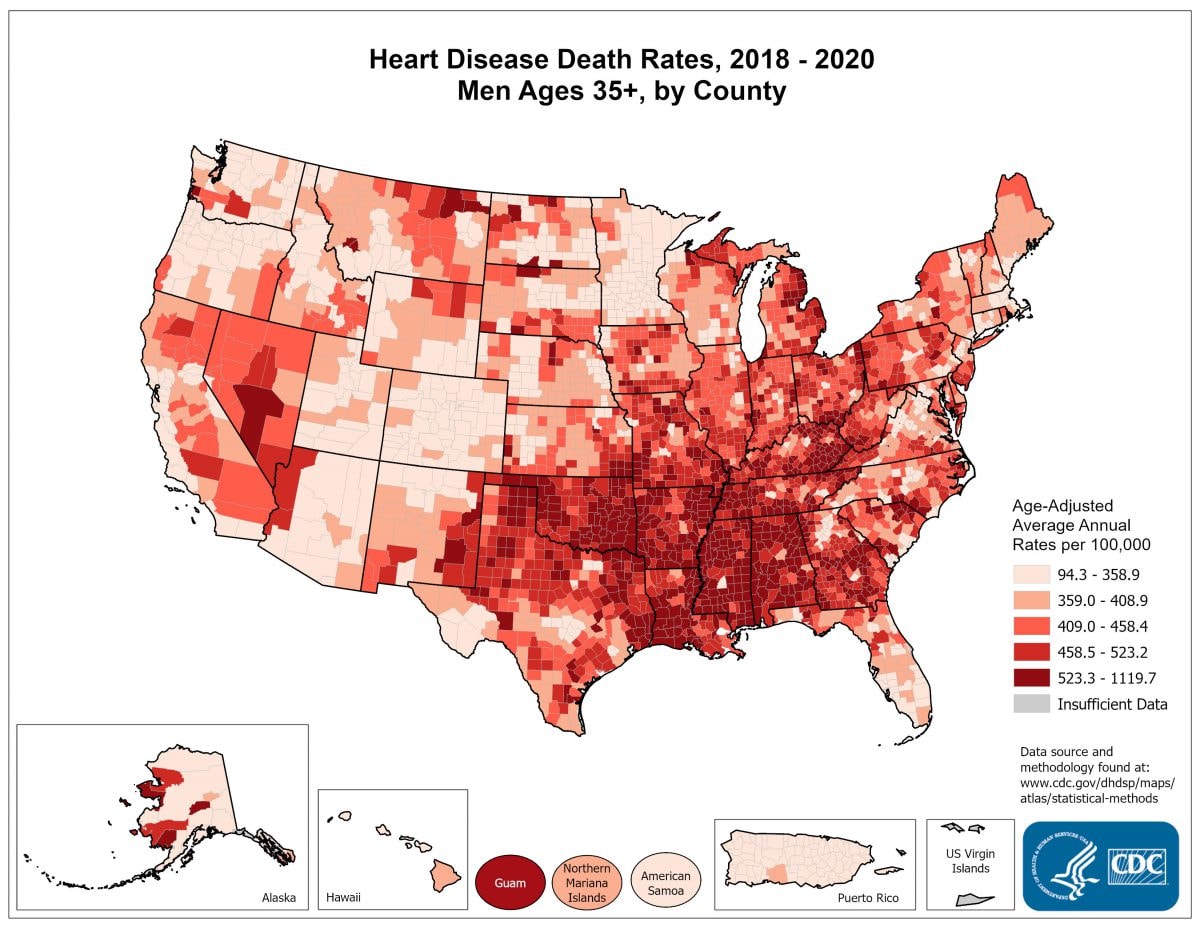Men and Heart Disease
The term heart disease refers to several types of heart conditions, including coronary artery disease and heart attack.
Heart disease is the leading cause of death for men in the United States.1
This map shows death rates from heart disease in men in the United States. The darker red indicates a higher death rate.

The map shows that concentrations of counties with the highest heart disease death rates – meaning the top quintile – are located primarily in Alabama, Mississippi, Louisiana, Arkansas, Oklahoma, Georgia, Kentucky, Tennessee and Guam. Pockets of high-rate counties also were found in Michigan, Ohio, West Virginia, Virginia, North Carolina, South Carolina, Missouri, Texas, Nevada, Montana, and Alaska.
How does heart disease affect men?
- Heart disease is the leading cause of death for men in the United States, killing 384,886 men in 2021—that’s about 1 in every 4 male deaths.1
- Heart disease is the leading cause of death for men of most racial and ethnic groups in the United States, including African Americans, American Indians or Alaska Natives, Hispanics, and whites. For Asian American or Pacific Islander men, heart disease is second only to cancer.2
- About 1 in 13 (7.7%) white men and 1 in 14 (7.1%) black men have coronary heart disease. About 1 in 17 (5.9%) Hispanic men have coronary heart disease.3
- Half of the men who die suddenly of coronary heart disease had no previous symptoms.4 Even if you have no symptoms, you may still be at risk for heart disease.
What are the symptoms of heart disease?
Sometimes heart disease may be “silent” and not diagnosed until a man experiences signs or symptoms of a heart attack, heart failure, or an arrhythmia.5 When these events happen, symptoms may include
- Heart attack: Chest pain or discomfort, upper back or neck pain, indigestion, heartburn, nausea or vomiting, extreme fatigue, upper body discomfort, dizziness, and shortness of breath.5
- Arrhythmia: Fluttering feelings in the chest (palpitations).5
- Heart failure: Shortness of breath, fatigue, or swelling of the feet, ankles, legs, abdomen, or neck veins.5
Even if you have no symptoms, you may still be at risk for heart disease.
What are the risks for heart disease?
In 2013–2016 47% of men had hypertension, a major risk factor for heart disease and stroke.7
Several other medical conditions and lifestyle choices can also put people at a higher risk for heart disease, including
- Diabetes
- Overweight and obesity
- Unhealthy diet
- Physical inactivity
- Excessive alcohol use
How can I reduce my risk of heart disease?
To reduce your chances of getting heart disease, it’s important to do the following:8
- Know your blood pressure. Having uncontrolled blood pressure can result in heart disease. High blood pressure has no symptoms so it’s important to have your blood pressure checked regularly. Learn more about high blood pressure.
- Talk to your health care provider about whether you should be tested for diabetes. Having diabetes raises your risk of heart disease.9 Learn more about diabetes.
- Quit smoking. If you don’t smoke, don’t start. If you do smoke, learn ways to quit.
- Discuss checking your cholesterol and triglyceride levels with your health care provider. Learn more about cholesterol.
- Make healthy food. Having overweight or obesity raises your risk of heart disease. Learn more about overweight and obesity.
- Limit alcohol intake to one drink a day. Learn more about alcohol.
- Lower your stress level and find healthy ways to cope with stress. Learn more about coping with stress.
More Information
CDC’s Public Health Efforts Related to Heart Disease
For more information on men and heart disease, visit the following websites:
